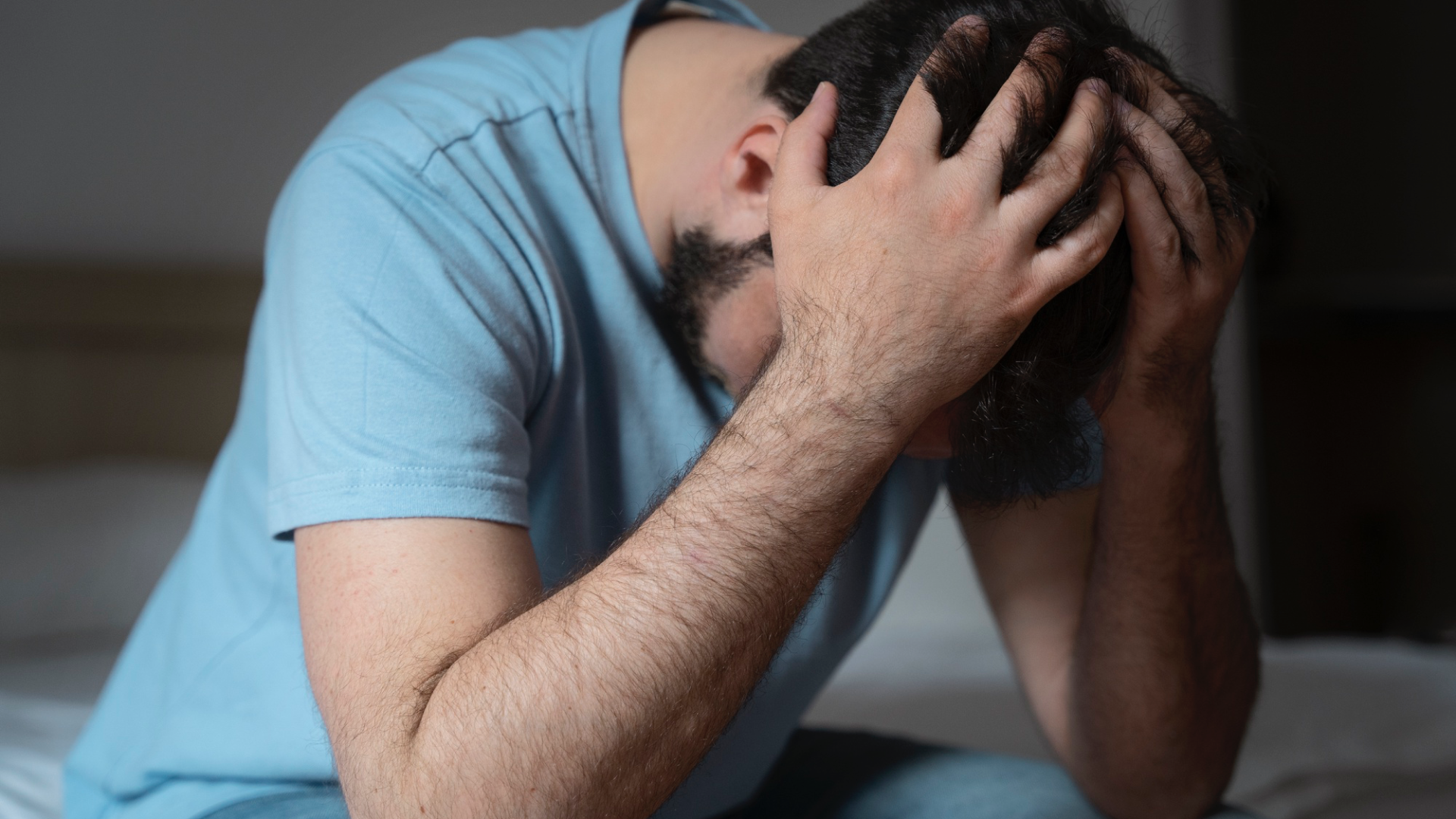Home / Mental Health Treatment / Co-Occurring Disorders
Community-Integrated Dual Diagnosis Treatment Centers in Maryland
Substance use and mental health disorders are often linked together.[1] Officially, neither one causes the other. However, it’s overwhelmingly common for each diagnosis to negatively influence the other.
If you or a loved one are facing a dual diagnosis or seeking co-occurring disorder treatment in Maryland, we welcome you to the MARC community. Here, we focus on long-term, sustainable recovery across a wide range of disorders and struggles.
As a dually-licensed facility, equipped to treat both substance use disorder and mental health conditions individually, we’re uniquely suited to address dual diagnosis concerns. Our approach to treating co-occurring disorders is to first understand you and your story and the tension of the two disorders that define your daily experience.
We want to fully embrace the unique challenges you face, and we’re committed to investing in your success—from treatment to ongoing sobriety and a stable, thriving life. Reach out today to get started.
Amanda Stevens

Dr. Po-Chang Hsu, M.D., M.S.
Amanda Stevens
Jump to Section
Key points
- A co-occurring disorder is the official classification for when a mental health condition and substance use disorder present together in the same patient.
- While each is unique, with different causes, risks, and symptoms, they can influence and exacerbate the other.
- Treatment for co-occurring disorders must take a holistic approach that addresses the person as a whole with respect to each unique diagnosis concurrently.
What Is A Co-Occurring Disorder?
A co-occurring disorder or dual diagnosis is the official classification for when one or more mental health disorders are present with substance or alcohol use disorder simultaneously.[2] The existence of both conditions can create complex dilemmas that make conventional life difficult and may present additional challenges to treatment.
The Substance Abuse and Mental Health Services Administration (SAMHSA) revealed that more than one in four adults who live with serious mental health conditions also struggle with substance abuse.[3] According to the numbers, SAMHSA shared that over 21 million adults in the US suffer from a dual diagnosis.[4]
To address these issues effectively, dual-diagnosis rehab facilities like MARC must address each disorder as a single diagnosis but with an acute awareness of how they intersect. As with any treatment solution, it is the person who needs healing, not the disorder or diagnosis.
Dual diagnosis care at MARC provides specialized and targeted interventions that recognize the complex dynamics of both mental health and substance use to enhance the treatment experience and improve recovery outcomes.
Our compassionate and qualified staff are eager to partner with you on your recovery and facilitate the best recovery experience. Welcome to the last dual-diagnosis rehab facilities you will ever need to attend.

Living With Addiction and Its Interaction with Mental Health
Living with a co-occurring diagnosis is already challenging, from daily decisions and capacity to emotional well-being and personal potential. In terms of recovery, it can also make treatment and recovery more difficult. As you are faced with the symptoms and effects of each, it can be increasingly difficult to think clearly and change harmful patterns with confidence.
Some of the most common mental health conditions associated with co-occurring disorders include:[5]
- Depression
- Anxiety
- Post-Traumatic Stress Disorder (PTSD) and Trauma
- Bi-Polar Disorder
- Attention-Deficit Hyperactivity Disorder (ADHD)
- Obsessive Compulsive Disorder (OCD)
- Personality Disorders
Some of the most common substance use disorders associated with co-occurring disorders encompass both illicit and prescription drugs, including:[6]
- Alcohol
- Heroin
- Fentanyl
- Cocaine
- Crack
- Benzodiazepines
- Methamphetamines
- Adderall
- Marijuana
Symptoms of both substance abuse and mental health conditions also have some overlap. Someone living with a co-occurring disorder may experience the following symptoms:[7]
- Depression and anxiety
- Psychosis or hallucinations
- Increased suicidal ideations
- Significant mood swings
- Isolation and social withdrawal
- Greater impulsivity
Common Causes of Co-Occurring Diagnosis
There is no clear or absolute cause that can be assigned to co-occurring disorders. However, mental health and substance use disorders are documented to share similar underlying causes that can lead to their development, including:[8]
- Brain composition changes
- Genetics
- Exposure to stress or trauma
Additionally, prolonged use of alcohol or harmful substances can increase the risk of developing mental illness, and likewise, those suffering from a mental illness are at increased risk for substance use disorder. [9] Studies reveal that in the U.S., 38% of all alcohol, 44% of all cocaine, and more than 50% of all opioid prescriptions are consumed by those with a mental illness. [10]
Treatment For Co-Occurring Disorders at MARC
We focus on a fully immersive, community-integrated approach to treatment and recovery. Our treatment facility holds a dual license, meaning we’re individually licensed to treat both substance use and mental health disorders; the perfect match for dual diagnosis patients.
We firmly belived that attending a few treatment sessions isn’t enough to radically improve your life. Our methods support you in the long term with options for extended care and sober living. Our levels of care include:
Therapeutic Modalities For Co-Occurring Disorders
A detailed and comprehensive intake evaluation helps us better understand your story. We want to connect you with the most suitable interventions based on your unique needs. The range of psychotherapy modalities offered at MARC includes both individual and group therapy sessions for the following interventions:
- Cognitive Behavioral Therapy (CBT): CBT empowers you to identify harmful thinking and create new thought patterns that help you make positive behavior changes.
- Dialectical Behavioral Therapy (DBT): DBT emphasizes accepting difficult circumstances and intense emotions while you learn valuable coping skills to reduce mood swings, impulsivity, and harmful patterns.
- Motivational Interviewing (MI): This intervention bridges the gap between desire and action by helping you cultivate meaningful motivation.
- Creative Arts Therapy: This modality brings creative pursuits together with guided therapy to unlock buried emotions, improve communication, build confidence, and increase self-awareness.
- Trauma Therapy: Together, we will help you address the impact that trauma has on the mind, body, emotions, and spirit.
- Recreational Therapy: More than just exercise, recreational therapy is a guided approach to fitness and movement that has a positive impact on all 360 degrees of the human experience.
- Vocational Support: With our support and education, you will get the help you need to gain greater personal autonomy and establish yourself in a career with an upward trajectory.
- Psychoeducation: Gain increased awareness surrounding all things related to addiction recovery, substance use, treatment, and sober living to enhance your quality of life and improve treatment outcomes.
Welcome To The MARC Recovery Community
We’re eager to help you build your new life and own your story. Reach out today to get started.
Frequently Asked Questions About Dual Diagnosis Treatment Centers Maryland
Effectively, there is no difference. Rather than using the term dual diagnosis to refer to two separate diagnoses, the term co-occurring disorder is a new diagnosis that encompasses both the mental health condition and the substance use disorder. This more modern term communicates the idea of treating the whole person with two diagnoses rather than two separate diagnoses.
With the right support, the prognosis is positive. Studies show that the best treatment outcomes are associated with an integrated approach that addresses both mental health issues and alcohol or drug addiction.[11] An integrated, holistic approach like we employ at MARC eliminates the need to seek two separate treatment plans, one for substance abuse treatment and one for drug or alcohol addiction. Everything you need is under one umbrella at our dual diagnosis treatment centers in Maryland.
Comorbidity refers to a physical or medical condition present with a mental health or substance use disorder. For example, if you or a loved one have diabetes or lupus, this could influence how other addiction treatment or drug rehab interventions are structured. Dual diagnosis specifically refers to mental health and substance use disorders being present together and does not include physical or medical conditions.
[1]The case for screening and treatment of co-occurring disorders. SAMHSA. (n.d.). https://www.samhsa.gov/co-occurring-disorders
[2]U.S. National Library of Medicine. (n.d.). Dual diagnosis. MedlinePlus. https://medlineplus.gov/dualdiagnosis.html
[3][8]Mental health and substance use co-occurring disorders. SAMHSA. (n.d.-a). https://www.samhsa.gov/mental-health/mental-health-substance-use-co-occurring-disorders
[4]2022 National Survey on Drug Use and Health (NSDUH) releases. SAMHSA.gov. (n.d.). https://www.samhsa.gov/data/release/2022-national-survey-drug-use-and-health-nsduh-releases
[5][6]Co-occurring disorders and other health conditions. SAMHSA. (n.d.-a). https://www.samhsa.gov/medications-substance-use-disorders/medications-counseling-related-conditions/co-occurring-disorders
[7]U.S. National Library of Medicine. (1970, January 1). Chapter 3-screening and assessment of co-occurring disorders. Substance Use Disorder Treatment for People With Co-Occurring Disorders: Updated 2020 [Internet]. https://www.ncbi.nlm.nih.gov/books/NBK571017/
[9]Nami. (2024, May 31). {Og: Title}. NAMI. https://www.nami.org/advocate/understanding-dual-diagnosis/
[10]Mental illness and substance abuse. NBER. (n.d.). https://www.nber.org/digest/apr02/mental-illness-and-substance-abuse
[11]Woody, G. (1996). The challenge of dual diagnosis. Alcohol health and research world. https://www.ncbi.nlm.nih.gov/pmc/articles/PMC6876494/